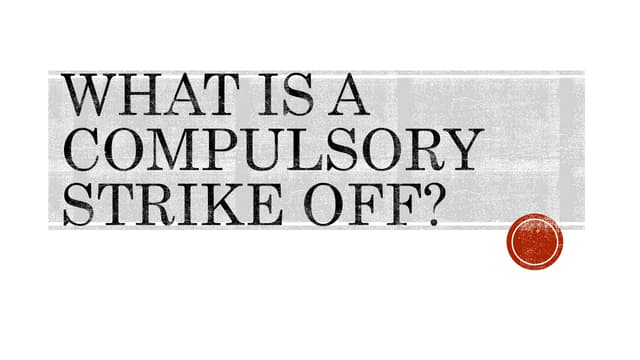Adhering To Regulatory Obligations: Trick Factors for Compulsory Strike off Execution
From meticulous documents practices to proactive communication with governing authorities, there are key aspects that organizations need to consider to navigate this process properly. By recognizing the subtleties of governing compliance and the effects of non-compliance, services can safeguard their procedures and online reputation.
Regulatory Conformity Assessment
When performing a regulative compliance analysis, it is vital to methodically review and assess all appropriate regulations, regulations, and guidelines that concern the specific sector or operation concerned. By thoroughly examining the lawful structure, services can ensure that they recognize their commitments and are equipped to support the required standards stated by regulative bodies.
During the analysis procedure, it is critical to determine any voids between present practices and regulative needs. This gap evaluation permits companies to determine locations of non-compliance and take restorative activities to reduce risks. Conducting an extensive testimonial makes it possible for business to develop inner controls and protocols that straighten with regulatory expectations.
Furthermore, a governing compliance assessment acts as a proactive action to stop prospective offenses that could lead to expensive charges or reputational damages. By remaining abreast of governing adjustments and constantly evaluating their conformity condition, companies can cultivate a culture of adherence to moral standards and lawful demands. Inevitably, an extensive regulatory conformity analysis is foundational in advertising operational honesty and sustainability.

Paperwork and Record-Keeping
Making certain precise documentation and exact record-keeping techniques is a cornerstone of governing conformity in any type of industry. Proper paperwork not only aids in meeting legal demands but also acts as a vital tool for interior surveillance and decision-making processes. Organizations must establish robust systems for documenting crucial activities, transactions, and decisions to guarantee openness and responsibility.
Keeping exact documents is essential for demonstrating conformity throughout governing audits or examinations. Records ought to be organized, quickly obtainable, and retained for the required period according to governing guidelines. Carrying out a central electronic paper monitoring system can enhance record-keeping procedures, improve information safety and security, and alleviate the danger of information loss or tampering.
Routine audits of documents techniques are critical to recognize spaces or variances that might result in compliance concerns. Educating workers on appropriate record-keeping treatments and data security steps is additionally important to maintain governing criteria. By focusing on precise documentation and record-keeping, companies can proactively alleviate compliance dangers and foster a culture of liability and stability within the company.

Timely Entry of Records
Proper paperwork and record-keeping methods lay the foundation for regulatory compliance; in a similar way, prompt submission of reports is paramount in demonstrating adherence to established procedures and meeting reporting commitments. Timely submission of records makes sure that regulative bodies obtain exact and updated details concerning the entity's procedures, economic status, and conformity with pertinent legislations and policies.
Failure to send records in a timely manner can result in charges, fines, or other enforcement actions. It can also elevate suspicions regarding the entity's general compliance society and governance practices. To help with timely entries, organizations must develop clear coverage timelines, assign enough sources for report preparation, and apply robust inner controls to keep an eye on deadlines and ensure precision.
In addition, timely submission of reports boosts openness and accountability, promoting count on with stakeholders, consisting of financiers, regulatory authorities, and the general public. compulsory strike off. It signifies a dedication to good administration techniques and regulatory conformity, which can favorably affect the entity's track record and trustworthiness in the market. By prioritizing the timely submission of reports, organizations show their dedication to running with integrity and based on suitable regulations and laws
Financial Transparency and Accountability
Demonstrating economic openness and liability is important for cultivating trust and integrity within a company's stakeholder area. By offering exact and clear economic information, companies can showcase their commitment to honest practices and sound administration. Openness in financial coverage enables stakeholders to evaluate the organization's performance, make informed decisions, click this link and hold management responsible for their actions.
To guarantee monetary openness, business must abide by bookkeeping requirements and policies, properly record economic purchases, and reveal details in a timely manner. Routine audits by independent third events can further confirm the precision and dependability of financial declarations. Additionally, executing interior controls and segregation of duties can help prevent scams and mistakes, enhancing total liability.
Efficient interaction of financial details through annual records, investor discussions, and stakeholder meetings is crucial for maintaining transparency. Business need to engage with stakeholders, address issues, and reply to questions promptly to build trust fund and enhance relationships (what is compulsory strike off). Inevitably, a dedication to financial transparency and liability not just fulfills regulative requirements yet likewise improves the company's track record and sustainability
Communication With Regulatory Authorities
Among the crucial of maintaining financial openness and accountability, reliable interaction with governing authorities stands as a crucial aspect in supporting business conformity and integrity. Clear and prompt interaction with regulative bodies cultivates count on and shows a dedication to regulative compliance, which is necessary for the smooth operation of any kind of organization. When involving with governing authorities, clarity and precision are paramount. Providing precise and total information makes certain that regulatory bodies have a comprehensive understanding of the company's tasks and can make informed decisions concerning conformity concerns.
Moreover, aggressive communication can help attend to possible conformity problems before they escalate, thereby preventing more significant governing concerns in the future. Regular discussion with regulatory authorities likewise permits organizations to stay notified concerning any changes in laws or reporting demands, enabling them to adjust their techniques as necessary. By maintaining open lines of interaction read here and promptly addressing any kind of inquiries or requests from regulatory authorities, companies can browse the regulative landscape more effectively and support their dedication to compliance and liability.

Verdict
Finally, making sure conformity with regulatory commitments is important for the successful implementation of required strike off gauges. By carrying out routine evaluations, maintaining complete documents, sending reports without delay, exercising monetary transparency, and communicating properly with regulative authorities, Visit Your URL organizations can mitigate the threat of being or dealing with charges struck off. It is vital for entities to maintain their obligations and stick to regulative needs to avoid any kind of unfavorable effects.
Guaranteeing thorough documentation and accurate record-keeping practices is a cornerstone of regulative compliance in any kind of market. first gazette notice for compulsory strike-off.Among the necessary of maintaining economic transparency and liability, effective interaction with governing authorities stands as a pivotal component in upholding organizational conformity and honesty. Transparent and prompt interaction with regulatory bodies promotes trust and demonstrates a dedication to governing conformity, which is important for the smooth procedure of any kind of organization. Offering accurate and full details ensures that regulative bodies have a thorough understanding of the organization's activities and can make educated choices relating to compliance problems
By preserving open lines of communication and quickly resolving any queries or demands from governing authorities, companies can browse the regulative landscape much more successfully and promote their commitment to conformity and accountability.